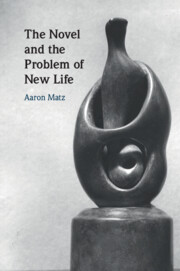Book contents
- The Novel and the Problem of New Life
- The Novel and the Problem of New Life
- Copyright page
- Dedication
- Epigraph
- Contents
- Preface
- Acknowledgments
- Chapter 1 Order and Origin
- Chapter 2 Revenge of the Unborn
- Chapter 3 Hardy and the Vanity of Procreation
- Chapter 4 Lawrence’s Storm of Fecundity
- Chapter 5 The Children of Others in Woolf
- Chapter 6 Reproduction and Dystopia
- Chapter 7 Lessing on Generations and Freedom
- Chapter 8 Procreating on Patmos
- Notes
- Works Cited
- Index
Chapter 6 - Reproduction and Dystopia
Published online by Cambridge University Press: 24 June 2021
- The Novel and the Problem of New Life
- The Novel and the Problem of New Life
- Copyright page
- Dedication
- Epigraph
- Contents
- Preface
- Acknowledgments
- Chapter 1 Order and Origin
- Chapter 2 Revenge of the Unborn
- Chapter 3 Hardy and the Vanity of Procreation
- Chapter 4 Lawrence’s Storm of Fecundity
- Chapter 5 The Children of Others in Woolf
- Chapter 6 Reproduction and Dystopia
- Chapter 7 Lessing on Generations and Freedom
- Chapter 8 Procreating on Patmos
- Notes
- Works Cited
- Index
Summary
Chapter 6, “Reproduction and Dystopia,” sets out to show that Aldous Huxley’s well-known satire of a reproductive future in Brave New World – humans engineered in bottles, sorted into different classes – is only a small part of his complex moral attitude toward procreation. Novels like Point Counter Point and Island make clear that it was not only cold reproductive technologies that worried Huxley: he considered any creation of new persons to be an ethical quandary. He was prescient in his concern about the environmental degradation brought on by overpopulation – in 1928 he was already warning of humanity’s “tropism toward fossilized carrion.” Huxley’s work betrays a deep melancholy about the peopling of the earth. In this respect he is a kind of prophet for a dystopian tradition that is still with us. This chapter, in its second half, turns from Huxley to his heirs – contemporary novelists like Margaret Atwood, Kazuo Ishiguro, Michel Houellebecq – whose glittering dystopian fantasies cannot conceal a more ordinary despair about the perpetuation of human life.
Keywords
- Type
- Chapter
- Information
- The Novel and the Problem of New Life , pp. 131 - 157Publisher: Cambridge University PressPrint publication year: 2021

